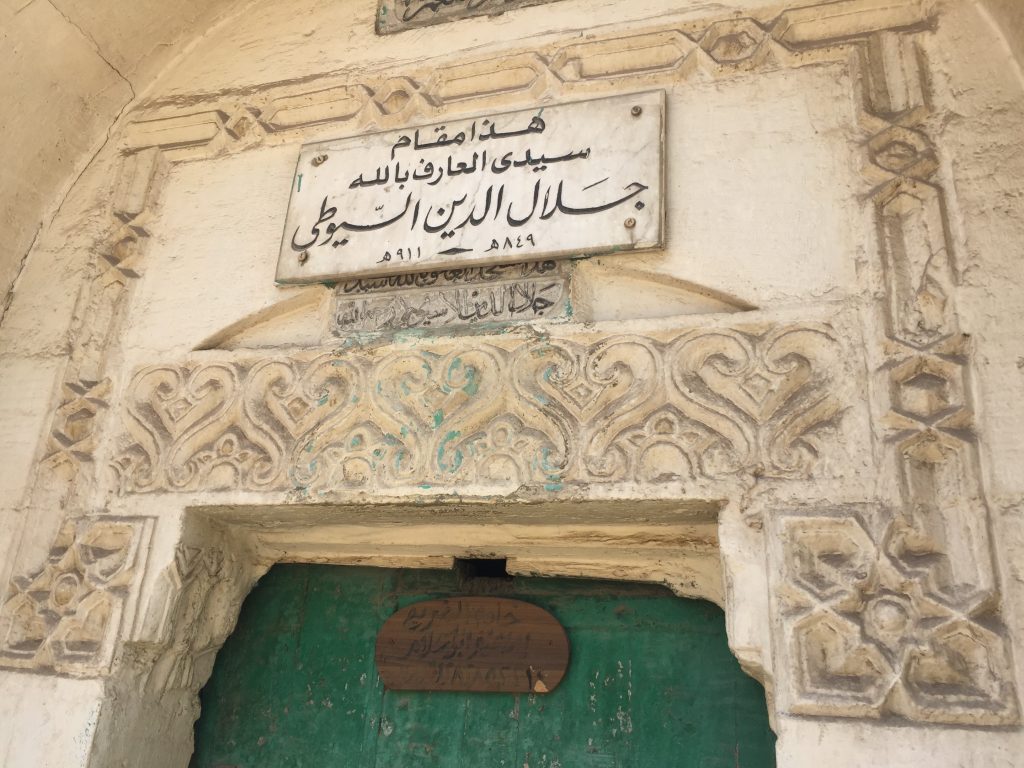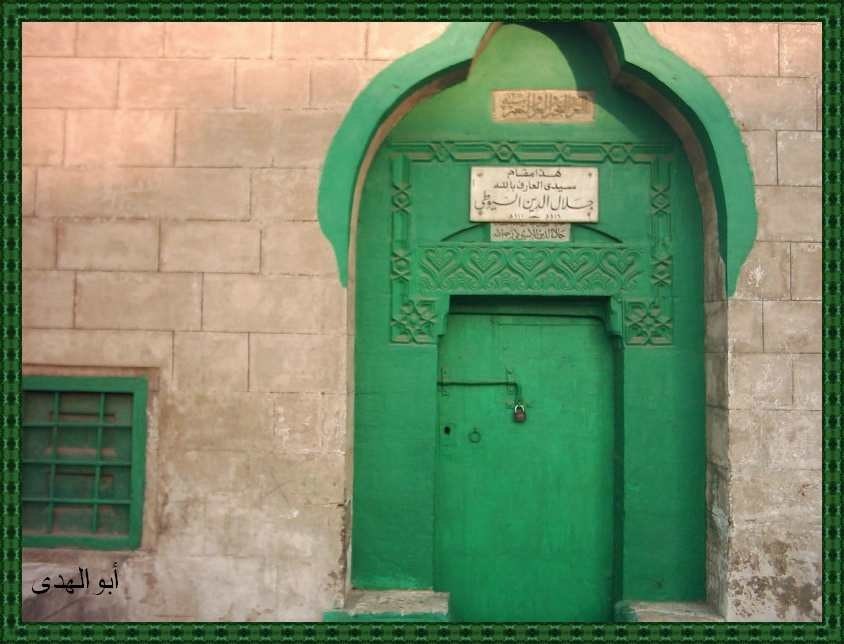Imam Jalāluddīn Suyūtī is a renowned name in religious circles and is held in high esteem alongside the intellectual giants of this Ummah. His literary contributions have helped scholars in all eras after him and till this day his works are being published and taken from manuscript form to be made accessible for the scholarly fraternity. This short piece is a brief biography of Imam Suyūtī, covering his life, works and accomplishments and his passing.
Birth and Studies
Imam Abdur Rahman bin Abi Bakr al-Suyūtī, born in Mamluk Egypt in the year 849 h. / 1449. The orphan son of a Persian father and a Turkish mother. He was born in a town called Asyut, which is where the name Suyūtī is derived from. From an early age, he was made financially independent by his father who was the Qadi (Islamic judge) in Asyut, which allowed him to pursue the journey of seeking sacred knowledge following in his father’s footsteps. By the ripe age of 8 he had completed the memorisation of the holy Qur’an, after which he went on to study the Islamic sciences at the age of 15.
Imam Jalāluddīn al-Suyūtī mentions an interesting anecdote regarding his studies. He narrates:
“In the initial stages of my studies, I began to read up on the science of Mantiq. Allah however placed its dislike in my heart, and I had heard that Imam Ibn Salah issued a fatwa of its impermissibility. So I left Mantiq and Allah substituted it for me with the science of Hadith which is the most noblest of sciences.”
Scholarly Position
For the duration of his quest of knowledge, Imam Suyūtī studied under 150 scholars, and travelled to many countries; namely: Damascus, Hijaz, Yemen, India, and Morocco. It was due to this sacrifice and struggle that Allah allowed him to reach a high station in the field of Tafsir, Hadith, Fiqh, Nahw and many other fields. Imam Suyūtī surpassed all of his peers in knowledge and rank- this led to much jealousy and rivalry being stirred up against him in Egypt. Upon arrival in Cairo, he immediately became a professor in numerous subjects, making his way through the ranks, until he became the head professor of the madrassah where he would teach.
Imam Suyūtī is quoted as having said:
و لما حججت شربت ماء زمزم لأمور منها أن أصل في الفقه إلى رتبة سراج الدين البلقيني و في الحديث إلى رتبة الحافظ ابن حجر
“ When I performed Hajj, I drank the water of zamzam with a few intentions, of those, was that I reach the level of Siraj al-din Bulqīni in Fiqh and the level of Hafiz Ibn Hajar in Hadith”
There is no doubt that Allah allowed him a great amount of encyclopaedic knowledge as a result, allowing his name to be mentioned among the stalwarts of the Ummah.
His Shuyūkh
These are a few names whom Imam Suyūtī studied under:
- Shaykh al-Islam Bulqīni – Shaykh Sharaf al-Deen Manāwi
- Allāmah Taqiuddin Al-Hanafi – Muhiuddin al-Kafīji
- Shaykh Saifuddin al-Hanafi – Allāmah Shihāb al-Din Sharimsāhi
- Jalāluddīn al-Mahalli – Ahmad bin Ibrahim al-Kināni
His Books
Imam Suyūtī has authored many books. All of which are outstanding in their fields. Many of Imam Suyūtī’s books are still studied and relied upon to this day. Below is a list some of his works:
1. Tafsīr al-Durr al-Manthūr 2. Tafsīr al-Jalalain 3. Al-Itqān Fi Ulūm al-Qur’an
4. Tadrīb al-Rāwi 5. Al-Ashbāh wa al-Nadhāir fil Fiqh 6. Jam’ al-Jawāmi’
7. Tabaqāt al-Mufassirīn 8. Husn al-Muhādharah 9. Sharh al-Sudūr
10. Al-Hāwi li al-Fatāwā 11. Al-Khasāis al-Kubrā 12. Al-La’ī al-Masnū’ah
Just to mention a few
A noteworthy point to mention here is that, Tafsīr al-Jalālain was actually written by Imam Jalāluddīn al-Mahalli. However he had only completed the tafsir of 15 juz’ (From Kahf to Surah Naas) and not the complete Qur’an. So Imam Suyūtī, ever so humbly, decided to complete the remaining 15 juz’ (from Baqarah to Kahf) in the exact same manner the 15 were written by Imam Mahalli. This is why it is famously known as Tafsīr al-Jalālain, because it was written by two ‘Jalal’s’. (To learn more about this, click here.)

The Piety of Imam Suyūtī
At the age of 40, Imam Suyūtī completely cut ties with one and all, and completely separated himself solely for the sake of ‘ibādah. He turned away from the dunya and its occupants completely and made himself only for Allah. To such an extent that he left issuing Fatwa and teaching! He stayed in this state until he passed away.
Upon one occasion, the Sultan gifted him 1000 dinar, and a ghauri1 servant. Imam Suyūtī returned the thousand dinars and took the servant. He then freed the servant and made him stay in the service of the blessed rawdhah of the Messenger of Allah. He told the king’s messenger, “Do not ever return to me with a gift again! For Allāh has made us rich beyond the need of such gifts.”
The Statements of Scholars Regarding the Imam
His student Ibn Iyās al-Hanafi said;
“He was a scholar, noble, well-versed in the blessed ahadith and other sciences. He was well-read and unique in his era. The remnant of the salaf and the best of those who came after. His publications number close to 600 books! And he was on the level of a mujtahid in knowledge and action.”
Allamah Najm al-Din al-Ghazzi says:
“He was the most knowledgeable of his era in the knowledge of Hadith, its sciences, the narrators, gharīb ahādith and the extraction of rulings from them. His praiseworthy qualities and accolades cannot be counted due to their number. If he did not have any miracle other than the mass number of his publications with their depth and research, it would suffice any person who believes in fate.”
His Passing
Imam Suyūtī passed away in the early morning of one jumu’ah in the year 911 h. at the age of 61. This was after contracting an illness which caused severe swelling in his left arm that lasted for seven days. It is written that the people of Damascus also prayed the janāzah prayer of absentee’s upon hearing of his demise. He was buried in Cairo and his grave can be visited today in the Al-Abageyah area.

Ml Hanzala Khan
Sha’bān 1444 h. | March 2023
References used:
Tafsīr al-Jalālayn, Aisha Bewley ,Dar al-Taqwa 2007
Tafsīr al-Dur al-Manthūr, Dar al-Fikr
Al-Durr al-Manthūr, Tahqīq Dr. Abdullah bin Abd al-Muhsin al-Turkī, Markaz Hijr li al-Buhūth wa al-Dirāsat al-Arabiyyah wa al-Islamiyyah, Edition one.
Al Itqān Fi Ulūm al-Qur’an, Tahqīq Sh Shu’aib al-Arnaut, Muassasa’ Risāla Nāshirūn, Edition one.


Leave a Reply